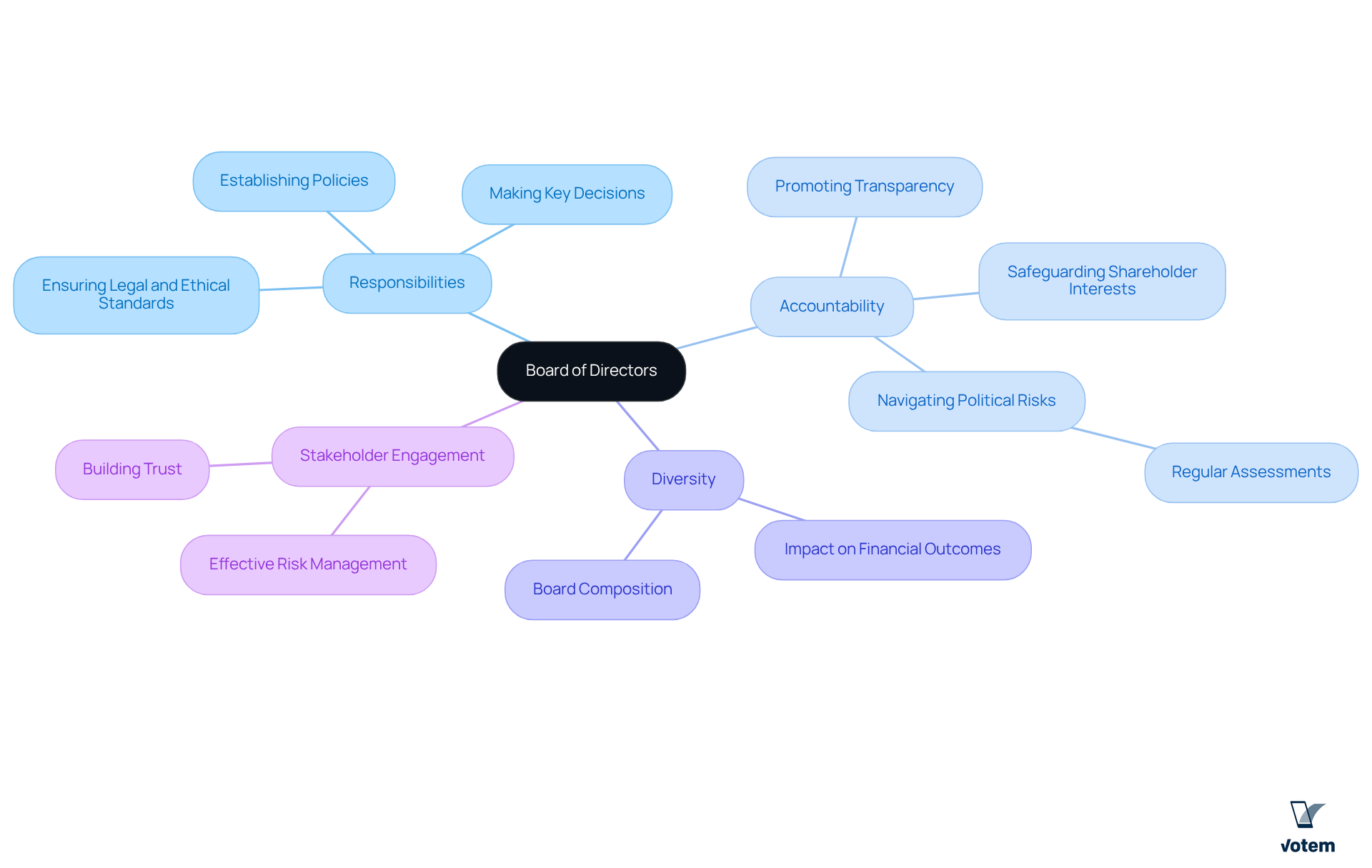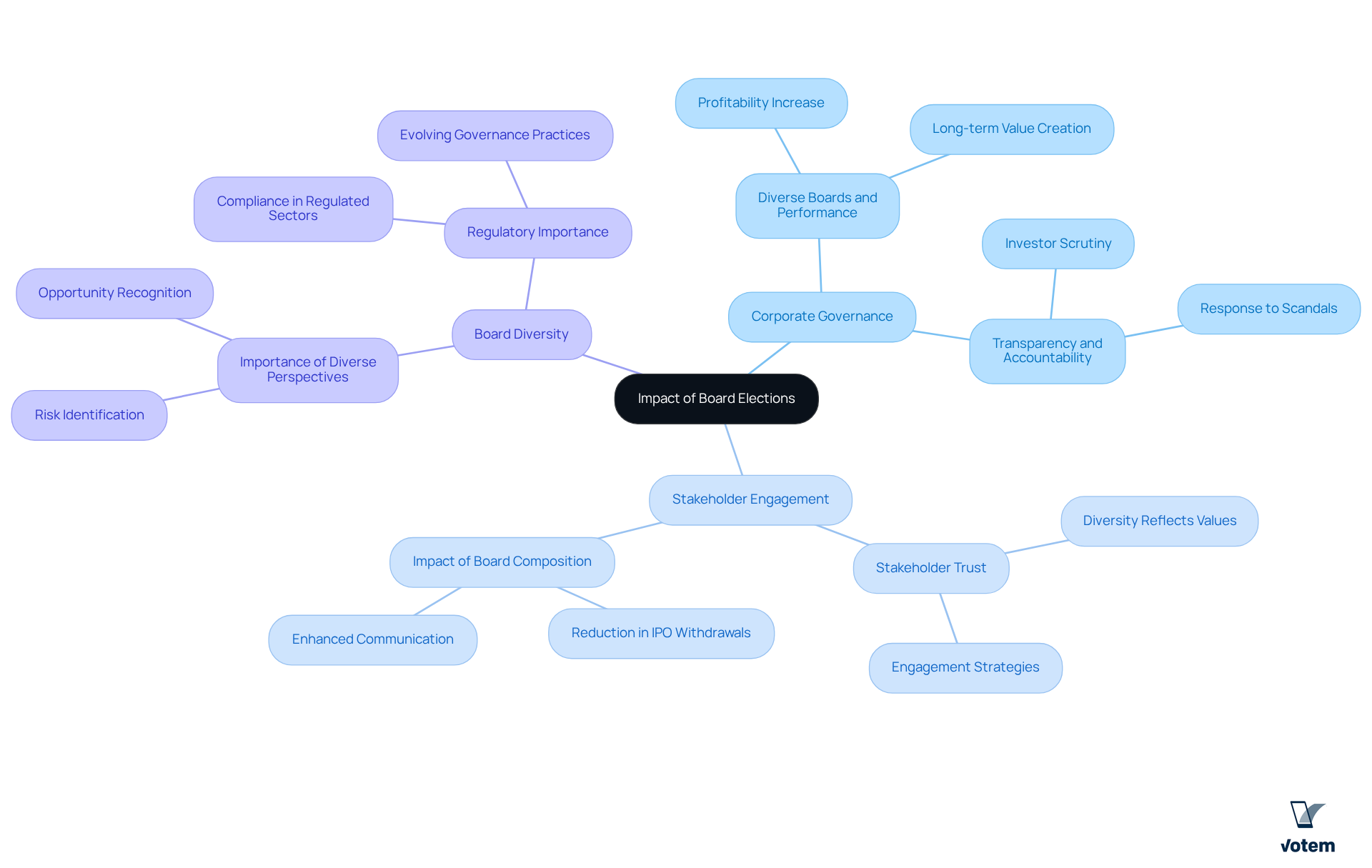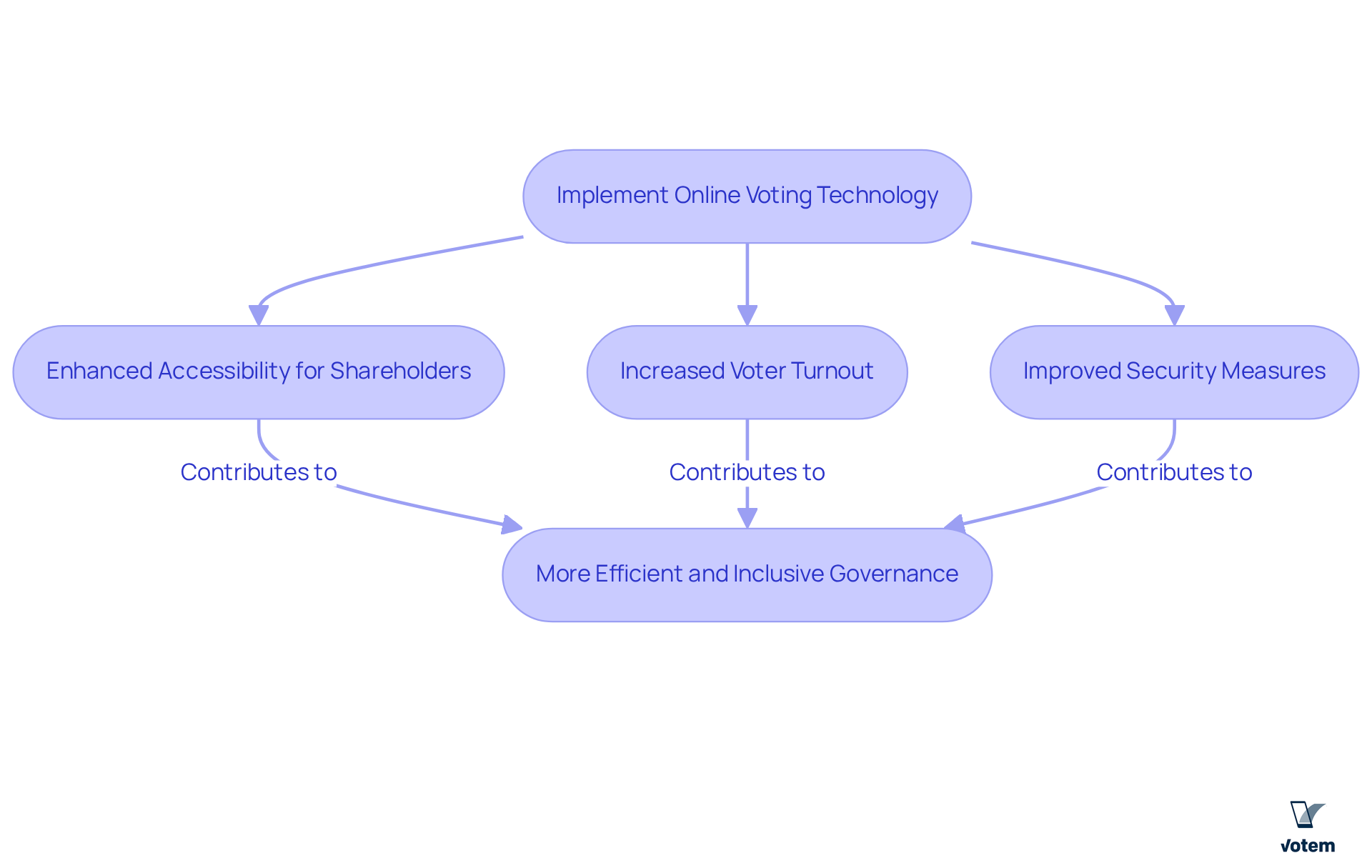Overview
The shareholders of the corporation typically elect the Board of Directors during annual meetings, a process that is crucial for ensuring that their interests are represented. This election process not only empowers shareholders but also enhances stakeholder engagement and accountability through methods such as cumulative voting. Furthermore, these practices ultimately lead to improved corporate governance and performance. By actively participating in the election process, shareholders can influence the direction of the corporation, fostering a sense of ownership and responsibility. In addition, the incorporation of diverse voting methods encourages broader participation, which is essential for a robust governance framework.
Introduction
The governance of a corporation fundamentally relies on the critical function of its Board of Directors, a group charged with the responsibility of protecting shareholder interests and guiding management decisions. Recognizing who holds the power to elect this board is essential, as it directly impacts corporate accountability, transparency, and overall performance.
Moreover, as the movement towards more inclusive and diverse boards gains traction, one must consider:
- How do these elections not only influence the makeup of leadership but also affect the engagement and trust of stakeholders in a corporate environment that is under increasing scrutiny?
Define the Board of Directors and Their Role in Corporations
The group of directors, which is what entity elects the board of directors for a corporation, serves as a pivotal governing entity selected by investors to oversee corporate management. Its primary responsibilities include:
- Establishing company policies
- Making key decisions
- Ensuring adherence to legal and ethical standards
Acting as a vital link between shareholders and management, this governing body safeguards shareholder interests while providing essential guidance and oversight to executives. Such a management framework is indispensable for promoting accountability and transparency—principles that are foundational to an organization’s long-term success and sustainability.
Looking ahead to 2025, the significance of the Directors’ Council will be underscored by an increasing scrutiny of corporate management practices. Notably, 84% of councils regularly assess political risks that could impact their strategies. This proactive stance not only bolsters organizational performance but also demonstrates the Board’s commitment to effectively navigating complex challenges. Furthermore, case studies reveal that firms with diverse boards tend to achieve superior financial outcomes, highlighting the critical role of diversity in leadership.
In this evolving landscape of corporate governance, it is essential for boards to prioritize accountability. This ensures they meet stakeholder demands for transparency and effective risk management, reinforcing their role as trusted stewards of corporate integrity.

Identify the Entity Responsible for Electing the Board of Directors
The primary responsibility of a corporation’s owners is to understand what entity elects the board of directors for a corporation, typically during the annual owners’ meeting. This election process clarifies what entity elects the board of directors for a corporation, allowing stakeholders to vote on the appointment or reappointment of directors and ensuring their interests are adequately represented. Furthermore, some corporations implement cumulative voting systems, enabling investors to allocate multiple votes among their preferred candidates. This approach not only amplifies investor influence but also cultivates a more democratic election process.
Current trends reveal an increasing adoption of cumulative voting systems, indicative of a shift towards enhanced stakeholder engagement and accountability. For instance, companies such as ExxonMobil have initiated programs that encourage retail shareholder participation, demonstrating the rising significance of inclusive voting practices. The role of cumulative voting in organizational management is paramount, as it nurtures a leadership group that is more responsive to the diverse needs of its stakeholders, ultimately bolstering accountability within the organization.

Discuss the Impact of Board Elections on Corporate Governance and Stakeholder Engagement
Elections for the governing body are crucial to corporate governance, as they determine what entity elects the board of directors for a corporation, fundamentally shaping its composition and effectiveness. A diverse and skilled group not only enhances decision-making processes but also fosters innovation, leading to significant improvements in organizational performance.
Research indicates that companies with diverse boards outperform their peers in terms of profitability and long-term value creation. This is largely because diverse perspectives help identify risks and opportunities that homogeneous groups might overlook. Furthermore, what entity elects the board of directors for a corporation directly influences stakeholder engagement; shareholders are more likely to feel invested in a company that reflects their values and interests.
For instance, a 10% increase in women’s presence on boards has been shown to reduce worldwide IPO withdrawals by up to 49%, underscoring the tangible benefits of diversity in fostering trust and engagement among stakeholders. Successful board elections result in enhanced transparency and improved communication with stakeholders, ultimately bolstering the organization’s reputation.
This dynamic is particularly crucial in regulated sectors, where compliance and ethical management are paramount. As the framework of business management evolves, the significance of varied and responsible boards cannot be overstated, especially in promoting trust and involvement among stakeholders.

The Role of Technology in Modern Board Elections
Technology is revolutionizing Board elections through secure online voting platforms, significantly enhancing accessibility for shareholders. Votem’s innovative CastIron platform empowers voters to participate from any location and at any time, fostering greater engagement. By employing advanced encryption methods, such as 256-bit encryption—equivalent to the security used by major banks—and adhering to strict compliance standards like NCUA, DOL, ERISA, and SOC 2, organizations can effectively safeguard the integrity of the voting process.
This technological shift not only boosts voter turnout but also cultivates transparency and trust in the electoral system. For instance, Votem’s management of 299,000 votes for the National Radio Hall of Fame marks a substantial increase from the previous year’s 126,000 votes. Furthermore, Votem’s platform has successfully handled significant voting events, including a record 224,969 valid votes for U.S. delegates to the 39th World Congress, demonstrating the efficiency of online voting in corporate management.
As organizations increasingly adopt these systems, they pave the way for more efficient and inclusive governance practices, ultimately benefiting all stakeholders involved. “Implementing Votem’s new, modern system which allowed greater access for all qualified voters from military voters to voters with disabilities was my greatest accomplishment in office,” said Linda McCulloch. “Votem helped deliver 123,000 votes, more than double the turnout of the last election in 2015 and the highest number of votes since the election began 30 years ago! Thank you!

Conclusion
The election of the board of directors stands as a cornerstone of corporate governance, fundamentally shaping the direction and integrity of a corporation. It is crucial for both shareholders and the overall health of the organization to understand who elects the board and why it matters. This process not only determines the leadership guiding a company but also reinforces the accountability mechanisms that protect stakeholder interests.
Key insights shared throughout the article illuminate the roles and responsibilities of the board of directors, the significance of diverse leadership, and the transformative impact of technology on the election process. The importance of transparency, stakeholder engagement, and the adoption of cumulative voting systems emerges as essential elements that enhance corporate governance. Furthermore, evidence indicates that companies with diverse boards tend to outperform their peers, underscoring the necessity of inclusive representation in decision-making.
In light of these discussions, it becomes evident that the election of the board of directors is not merely a procedural formality but a vital practice influencing organizational success and stakeholder trust. Companies are encouraged to embrace innovative voting technologies and inclusive practices to foster greater engagement and accountability. Ultimately, the commitment to electing a competent and diverse board can lead to improved performance, sustainability, and a stronger alignment with shareholder values, reinforcing the critical role of governance in today’s corporate landscape.
Frequently Asked Questions
What is the role of the Board of Directors in a corporation?
The Board of Directors serves as a governing entity elected by investors to oversee corporate management, establish company policies, make key decisions, and ensure adherence to legal and ethical standards.
How does the Board of Directors act as a link between shareholders and management?
The Board of Directors safeguards shareholder interests while providing guidance and oversight to executives, promoting accountability and transparency within the organization.
Why is the Board of Directors important for long-term success and sustainability?
The management framework established by the Board is essential for promoting accountability and transparency, which are foundational principles for an organization’s long-term success and sustainability.
What trends are expected to influence the Board of Directors by 2025?
By 2025, there will be increased scrutiny of corporate management practices, with 84% of councils regularly assessing political risks that could impact their strategies, demonstrating a commitment to navigating complex challenges.
How does board diversity impact corporate performance?
Case studies reveal that firms with diverse boards tend to achieve superior financial outcomes, highlighting the critical role of diversity in leadership.
What should boards prioritize to meet stakeholder demands?
Boards should prioritize accountability to ensure they meet stakeholder demands for transparency and effective risk management, reinforcing their role as trusted stewards of corporate integrity.
List of Sources
- Define the Board of Directors and Their Role in Corporations
- Key challenges boards should address in 2025 (https://kpmg.com/au/en/insights/leadership/board-leadership-challenges.html)
- The Boardspan Newsletter – Corporate Governance News & Board Insights (https://boardspan.com/newsletter)
- Corporate Governance News | Today’s Latest Stories | Reuters (https://reuters.com/legal/corporate-governance)
- Board of directors News, Research and Analysis – The Conversation (https://theconversation.com/topics/board-of-directors-131400)
- Identify the Entity Responsible for Electing the Board of Directors
- SEC Permits Retail Shareholder Voting Programs for Proxy Matters That Follow Board Recommendations [Alert] (https://cozen.com/news-resources/publications/2025/sec-permits-retail-shareholder-voting-programs-for-proxy-matters-that-follow-board-recommendations)
- ExxonMobil Gets the Green Light from the SEC for its Groundbreaking Retail Shareholder Voting Program (https://bipc.com/exxonmobil-gets-the-green-light-from-the-sec-for-its-groundbreaking-retail-shareholder-voting-program)
- Implications of the SEC’s Approval of a New Retail Shareholder Voting Program | JD Supra (https://jdsupra.com/legalnews/implications-of-the-sec-s-approval-of-a-4922799)
- Proxy vote meaning: Complete guide to proxy voting (https://diligent.com/resources/blog/proxy-voting-guidelines)
- SEC Grants No-Action Relief for Retail Voting Program (https://sidley.com/en/insights/newsupdates/2025/09/sec-grants-no-action-relief-for-retail-voting-program)
- Discuss the Impact of Board Elections on Corporate Governance and Stakeholder Engagement
- Change the Board Game, an Initiative Founded by e.l.f. Beauty, Grows Coalition Championing Inclusivity on Corporate Boards (https://businesswire.com/news/home/20251001512227/en/Change-the-Board-Game-an-Initiative-Founded-by-e.l.f.-Beauty-Grows-Coalition-Championing-Inclusivity-on-Corporate-Boards)
- Boardroom Culture Shifts: How Key Changes Impact Governance (https://boardroompulse.com/boardroom-culture-shifts-key-changes-and-their-impact-on-corporate-governance)
- Post-Election Regulatory Changes to Corporate Govern… (https://dechert.com/knowledge/onpoint/2025/2/post-election-regulatory-changes-to-corporate-governance-mirror-.html)
- Governance Matters: Don’t Overlook Board Oversight (https://alliancebernstein.com/corporate/en/insights/investment-insights/governance-matters-dont-overlook-board-oversight.html)
- Board diversity and shareholder voting (https://sciencedirect.com/science/article/abs/pii/S0929119923001360)
- The Role of Technology in Modern Board Elections
- Home – Voatz secure and convenient voting anywhere (https://voatz.com)
- Online Voting with Votem® | Elections Made Easy (https://votem.com)
- Voting Online, Simplified with ElectionBuddy – ElectionBuddy (https://electionbuddy.com)
- eBallot | Secure Online Voting Platform & Election Software (https://eballot.com)

